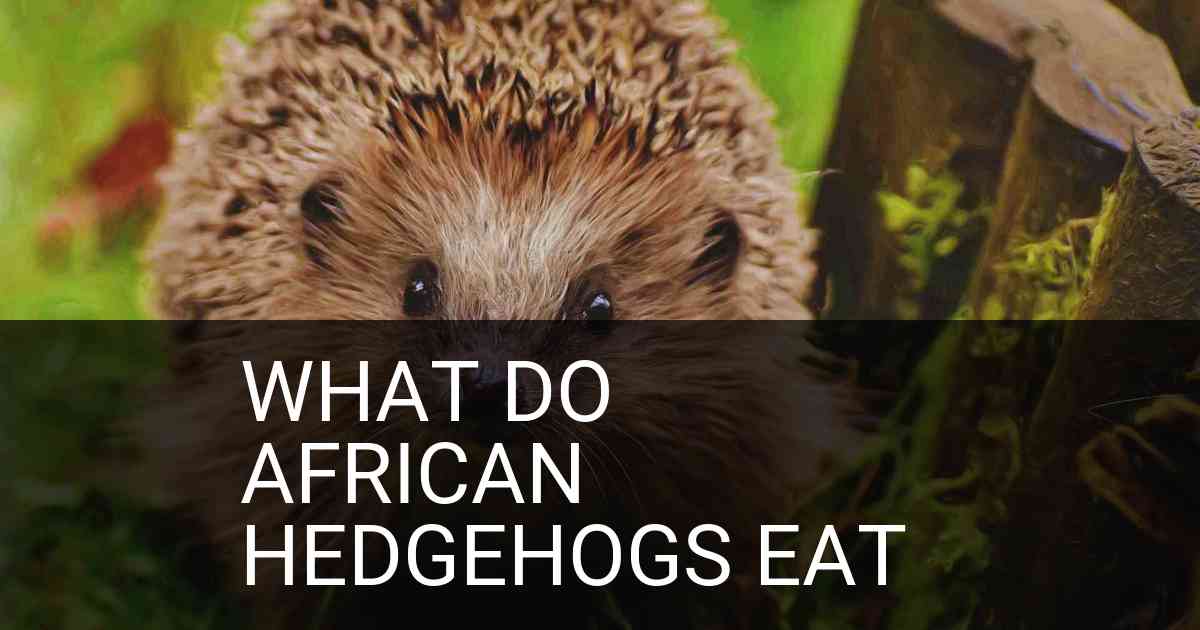
African hedgehogs are a unique species of small mammal found in many parts of Africa. These animals have become popular pets in recent years, but not everyone is aware of their dietary needs. In this article, we will discuss what African hedgehogs eat and the best way to provide them with nutritious meals. We’ll also cover some important tips for providing suitable food and habitats for your pet hedgehog. Read on to learn more about these fascinating creatures and how you can ensure they live long and healthy lives!
What Do African Hedgehogs Eat?
African hedgehogs are omnivores, which means they eat both plant and animal matter. They prefer a diet that includes insects, such as crickets and mealworms, along with fruits, vegetables, and some commercial hedgehog food. A balanced diet for your pet should include:
- Insects (crickets, mealworms) — this should make up the bulk of their diet.
- Fruits and vegetables — aim to provide at least one type of each daily.
- Commercial hedgehog food — look for a high-quality kibble or pellet designed specifically for hedgehogs.
- Occasional treats (like boiled eggs or cooked meat) can be offered in moderation.
Fruits and Vegetables
Fruits and vegetables should make up the bulk of an African hedgehog’s diet. Offer your hedgehog fresh produce such as apples, bananas, carrots, spinach, kale, sweet potatoes, zucchini and other dark green leafy vegetables. Avoid fruit or vegetable juices since they contain too much sugar.
Protein Sources
Protein sources should also be included in your hedgehog’s diet. Good choices include boiled eggs (without shells), cooked lean meats such as chicken or turkey breast (with no added spices or seasonings), small amounts of cooked fish (such as canned tuna), earthworms and mealworms. Be sure to avoid fatty cuts of meat or processed meats like hot dogs.
What Wild African Hedgehogs Eat
Wild African hedgehogs are omnivorous animals, meaning they eat both plants and animals. Their diet is mainly composed of insects, small reptiles, amphibians, fruits, nuts, and other plant matter.
Insects
Insects make up the bulk of a wild African hedgehog’s diet. They feed on beetles, moths, crickets, grasshoppers, earthworms and snails.
Small Reptiles & Amphibians
Hedgehogs will sometimes hunt and consume small reptiles such as lizards or snakes if they come across them. They can also eat frogs and toads.
Fruits & Nuts
Hedgehogs enjoy various types of fruit such as apples, bananas, strawberries, blueberries, raspberries, blackberries. In addition to these fruits they are also known to eat a variety of nuts like almonds, walnuts, hazelnuts.
Other Plant Matter
Wild African hedgehogs also feed on various types of vegetation such as mushrooms, flowers and leaves. They may also scavenge for food in gardens or eat fallen seeds from trees.
The Best Foods for a Hedgehog
Hedgehogs are omnivores, which means they can eat both plants and animals. To keep your pet hedgehog healthy, it’s important to provide them with a balanced diet that consists of both proteins and carbohydrates. Here are the best foods to feed your hedgehog:
Fruits and Vegetables
Fruits and vegetables should make up about 20-30% of a hedgehog’s diet. Some great options include apples (without seeds), pears, peaches, melon, bananas, strawberries, blueberries, carrots, cucumbers, tomatoes, bell peppers and squash.
Protein Sources
Protein sources should make up around 30-40% of a hedgehog’s diet. Good choices include cooked eggs (scrambled or boiled), lean meats such as chicken or turkey (boiled or grilled without skin) as well as lean beef or pork (ground). You can also offer mealworms and other insects such as crickets.
Grains and Starches
Grains and starches should be limited in a hedgehog’s diet but can still be offered in moderation. Oatmeal is an excellent choice as is brown rice. You can also offer small amounts of bread or pasta occasionally.
- Do not feed your hedgie sugary treats like candy or chocolate.
- Avoid high fat foods such as bacon, fatty meats or oily fish.
- Keep dairy products to a minimum since many hogs are lactose intolerant.
Conclusion
African hedgehogs are omnivores that feed on a wide variety of food items in the wild. They primarily consume insects, such as beetles and caterpillars, but they also eat earthworms, snails, lizards, rodents, and other small animals.
As pets, African hedgehogs should be provided with a well-balanced diet that includes both commercial dry cat or dog food and live prey items like mealworms or crickets. Offering them fruits and vegetables as snacks is also beneficial to their overall health. With proper nutrition and care from their owners, African hedgehogs can lead healthy lives for up to five years.

